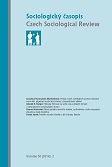Taste and the Logic of Practice in Distinction
Taste and the Logic of Practice in Distinction
Author(s): Omar LizardoSubject(s): Social Sciences
Published by: AV ČR - Akademie věd České republiky - Sociologický ústav
Keywords: habitus; taste; Bourdieu; distinction; practice
Summary/Abstract: Proper engagement with the theory of taste that Bourdieu formulates in Distinction [1984] has been marred by an inability to differentiate between the theory of the functions of taste and the theory of the origins of taste. In this paper, the author shows that the theory of taste developed in Distinction is one concerned primarily with the origins and only secondarily with the functions of taste. The author further argues that this theory is inseparable from Bourdieu’s practice-theoretical project; it therefore cannot be coherently understood or evaluated unless it is presented in those terms (with habitus as the centrepiece concept). To that end, the author engages in a close reading of the basic argument in Distinction and shows that, according to Bourdieu, there is a tight (dynamically adjusting) relationship between tastes, conscious preferences, practical anticipations, and accumulated competences. Likes and dislikes function as partial glimpses into the store of practical capacities for cultural appropriation accumulated by a person. Most importantly, tastes operate via practical anticipatory action and not by conscious regulation. The author closes by outlining the implications of Bourdieu’s ‘scandalous’ proposal for future research in the sociology of taste.
Journal: Sociologický časopis / Czech Sociological Review
- Issue Year: 50/2014
- Issue No: 03
- Page Range: 335-364
- Page Count: 30
- Language: English

